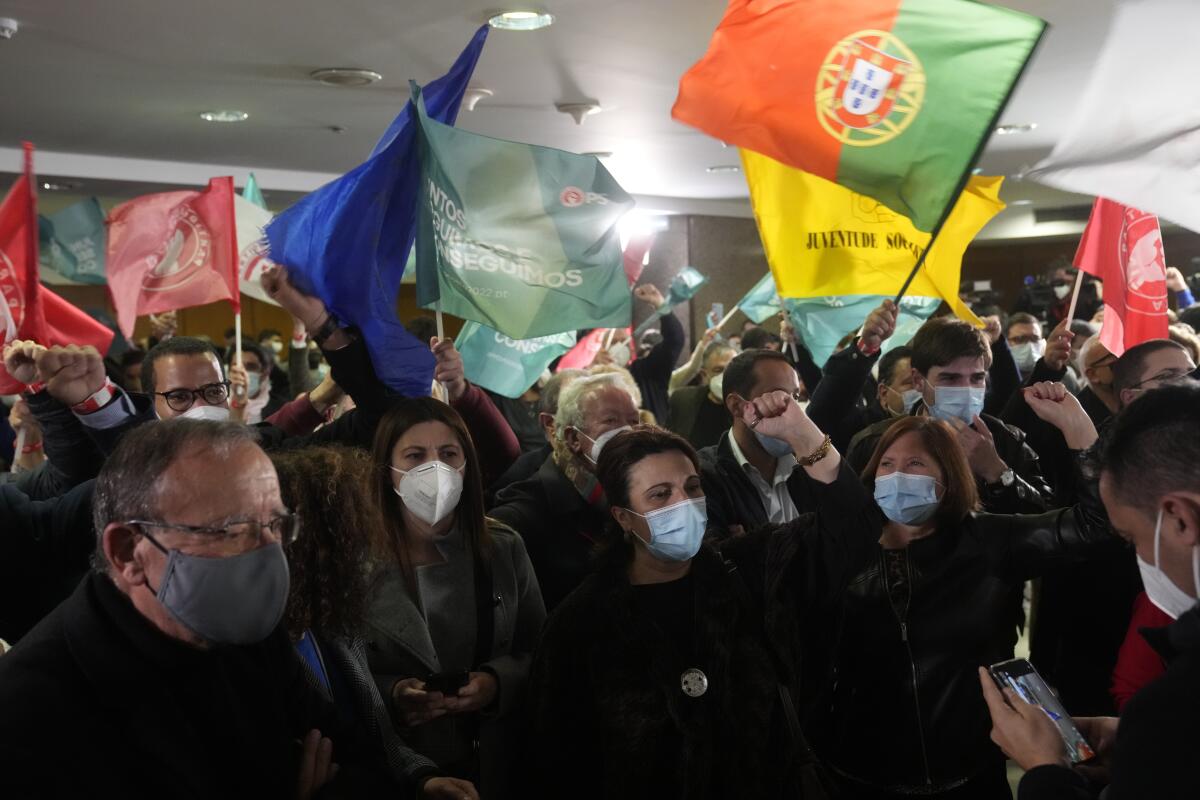Socialist Party wins reelection in Portugal, plans major investments to boost economy

- Share via
LISBON — Portugal’s center-left Socialist Party won a third straight general election Sunday, official results showed, returning it to power as the country prepares to deploy billions of dollars in European Union aid for the economy after the COVID-19 pandemic.
In an election that took place amid a surge of COVID cases blamed on the Omicron variant, and with about 1 million infected voters allowed to leave home to cast their ballots, the Socialist Party elected at least 112 lawmakers in the 230-seat parliament.
With 98.7% of votes counted, the Socialist Party had 41% of the vote, compared with 28% for its main rival, the center-right Social Democratic Party, which took at least 68 parliamentary seats. Eighteen seats were still to be allocated.
It was still unclear whether the Socialist Party would reach 116 lawmakers, allowing it to enact legislation alone, or whether it would fall short of that number and need to cut deals to gain the support of smaller parties.
Portugal, a country of 10.3 million people and the poorest in Western Europe, is poised to begin deploying $50 billion in aid as a member of the European Union to help spur the economy.
Two-thirds of that sum is intended for public projects, such as major infrastructure, giving the next government a financial bonanza. The other third is to be awarded to private companies. A parliamentary majority would smooth the next government’s path in allocating those funds in a country whose economy has struggled to gain traction since the turn of the century.
The Socialist Party, which has governed for the last six years, and the Social Democratic Party are Portugal’s two main political parties. They have alternated in power for decades.
Chega!, a populist and nationalist party founded less than three years ago, appeared to have collected 5% to 8% of Sunday’s vote. That might give it as many as 13 lawmakers, up from one in the last parliament.
A poll indicated the Left Bloc may have captured 3% to 6% of the vote, with 3% to 5% going to the Portuguese Communist Party.
President Marcelo Rebelo de Sousa, in an election-eve address to the nation, urged people to vote, declaring that it was “a way of saying that ... nothing, and nobody, can silence our voice.”
He said the coming years would be marked by “leaving behind a painful pandemic and an urgent rebuilding of the economy.”
Since it came to power in 2015, the Socialist Party had relied on the support of their smaller allies in parliament — the Left Bloc and the Portuguese Communist Party — to ensure the annual state budget had enough votes to pass. But two months ago their differences, especially over public health spending and workers’ rights, were insurmountable, leaving Socialist Prime Minister António Costa short of votes to pass his party’s plan.
The Socialist Party promised to increase the minimum monthly wage, earned by more than 800,000 people, to $1,020 by 2026. It is currently $800. The Socialist Party also wants to “start a national conversation” about working four days a week instead of five.
Portugal’s economy has been falling behind the rest of the 27-nation EU since 2000, when its real annual gross domestic product per capita was $18,300, compared with an EU average of $25,330. By 2020, Portugal had edged higher to $19,250, while the bloc’s average surged to $29,750.
The Social Democratic Party had pledged income tax cuts and more help for private companies, cutting corporate taxes from the current 21% to 17% by 2024.
More to Read
Sign up for Essential California
The most important California stories and recommendations in your inbox every morning.
You may occasionally receive promotional content from the Los Angeles Times.










